Neocities.org

 suboptimalism
4 months ago
suboptimalism
4 months ago
wow... i really messed up... tempted to delete your comment and edit it but that would be dishonorable...
 readingproject
5 months ago
readingproject
5 months ago
You're right: the idea that an author holds a secret which we try to guess is simplistic. I used to write sample pieces for students as part of creative writing to demonstrate this (because they had the "author" in the classroom, so we could overcome that part of the issue)
 readingproject
5 months ago
readingproject
5 months ago
Students invariably interpreted my writing in ways I didn't expect. It was great
 suboptimalism
5 months ago
suboptimalism
5 months ago
that piece was inspired by a similar experience - someone read something i wrote and had an interpretation i hadn't thought of at all, but that struck me as equally valid
 letslearntogether
5 months ago
letslearntogether
5 months ago
Fascinating article and conversation! I've had similar experiences. Funnily enough, interpretation of spiritual texts (i.e.: the field of "hermeneutics") actually discourages people from reading their own meaning into passages ("eisegesis") versus trying to understand what the author was attempting to convey specifically ("exegesis").
 letslearntogether
5 months ago
letslearntogether
5 months ago
Where it gets really interesting is when considering how personal approach and social application relate. Is it a story with layer upon layer of metaphor or is it intended to be a legal framework that people live by? What if it is both simultaneously? These questions are not always easily answered.
 saddleblasters
5 months ago
saddleblasters
5 months ago
The interplay between author's intention and the reader's personal experience is such a fascinating topic, and it always seems like there's something new to be said about it. Two ideas that come to mind from a literary theory course I took are (1) Foucault's author function, where he replaces the author with something more abstract,
 saddleblasters
5 months ago
saddleblasters
5 months ago
and (2) wolfgang iser's theory that the world in the readers mind comes into existence precisely when there are gaps in the author's text. I.e. the power of fiction is completely derived from its subjectivity and openness to interpretation.
 saddleblasters
5 months ago
saddleblasters
5 months ago
References for anyone interested: https://www.sas.upenn.edu/~cavitch/pdf-library/Foucault_Author.pdf https://www.jstor.org/stable/468316
 saddleblasters
5 months ago
saddleblasters
5 months ago
I find the foucault essay kind of hard to follow, but it was very influential. Iser's perspective was very memorable to me and has been a big influence on how I think about both reading and writing
 suboptimalism
4 months ago
suboptimalism
4 months ago
if i recall correctly i was inspired by something i read in the "polemical introduction" of frye's "anatomy of criticism" while on 3 cups of coffee. can't promise anyone else will be able to find what i did in it, though. still have to go back and finish the rest sometime too.
 readingproject
4 months ago
readingproject
4 months ago
Think I've found it - from Frye: "The absurd quantum formula of criticism, the assertion that the critic should confine himself to 'getting out' of a poem exactly what the poet may vaguely be assumed to have been aware of 'putting in', is one of the many slovenly illiteracies that the absence of systematic criticism has allowed to grow up . . .
 readingproject
4 months ago
readingproject
4 months ago
". . . That is, the critic is assumed to have no conceptual framework: it is simply his job to make a poem into which a poet has diligently stuffed a specific number of beauties or effects, and complacently extract them one by one, like his prototype Little Jack Horner."
 saddleblasters
5 months ago
saddleblasters
5 months ago
re:frontiers, i'm not sure they're as absolute as you're saying. frontiers are created all the time. a lot of the barriers to new things are rules established players with money and power set to protect themselves (as you observed). but sometimes external factors result in those players' interests all aligning at once towards removing barriers and giving money to anyone promising, which opens new frontiers.
 saddleblasters
5 months ago
saddleblasters
5 months ago
in the case of the new world, one of the parties that would normally defend its own interests was dead. which is probably a general pattern with both literal and metaphorical frontiers. there was a frontier for japanese electronic music in the 80s, which made a lot of music i love, but in that case it was the money people who suffered, so it was over in a few years.
 suboptimalism
5 months ago
suboptimalism
5 months ago
i was thinking pretty strongly in terms of physical frontiers for that one, if you want to create a new state it's just not possible. i forgot to add this but even the group of powerful silicon valley billionaires trying to start a new city in the barren inland area east of the bay area are getting stonewalled hard.
 suboptimalism
5 months ago
suboptimalism
5 months ago
art is an interesting case because "new territory" can be created to some extent, e.g. when a new medium or style is invented. money can help but too much of it risks inflating a bubble or attracting parasites and grifters.
 saddleblasters
5 months ago
saddleblasters
5 months ago
Sorry, I got confused by the Silicon Valley example (also I realize these are just notes, so I probably shouldn't be picking them apart). But with the new world, it was only "stateless" (obv modern concept of state didn't exist yet) because the people who lived there had been neutralized by disease. The frontier wasn’t just always there — it had to be created.
 saddleblasters
5 months ago
saddleblasters
5 months ago
Sorry for writing so much, but one more thing I thought of is that frontiers still exist, or at least did up until recently. E.g. Xinjiang was something of a frontier for Han Chinese wanting to make money far away from home, and the repercussions of that are still very visible today.
 saddleblasters
5 months ago
saddleblasters
5 months ago
All of this is making me think of the Nazi doctrine of “Living Space” (Lebensraum), if you haven’t heard of it before. It dreamt of creating a new frontier out of the populated space surrounding Germany. As an American, no one ever told me growing up that it was directly inspired by American manifest dynasty https://en.wikipedia.org/wiki/Lebensraum#Lebensraum_as_theory_in_Hitlerism
 suboptimalism
5 months ago
suboptimalism
5 months ago
now i am thinking it is a shame nobody creates frontiers willingly/deliberately as a venue for social experimentation, it always seems to be by force or by accident. i wonder if it is even possible to "create" a frontier artificially...
 suboptimalism
5 months ago
suboptimalism
5 months ago
yes - there are other ways to put it as well, such as mechanistic vs. mentalistic thinking. i had written more about it on my site a while ago but accidentally deleted it without backups a couple months ago
 vashti
6 months ago
vashti
6 months ago
What you wrote about Snoopy & Hello Kitty & lack of narratives is interesting, because I didn't really grow up with Snoopy at all. I began to like Snoopy somewhat recently in the same way I liked Hello Kitty & crew- a cute but blank character. I saw him as just a cute puppy for a while before actually reading any of the comics & thus giving Snoopy a narrative in my mind.


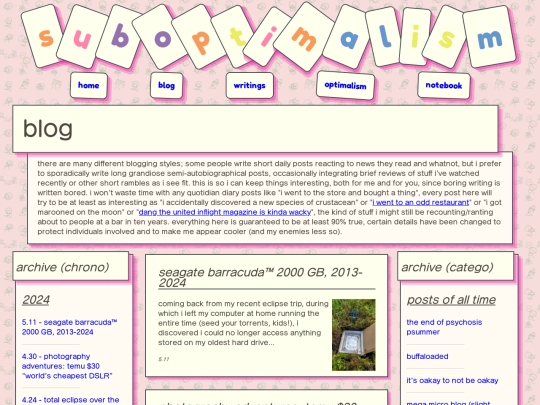
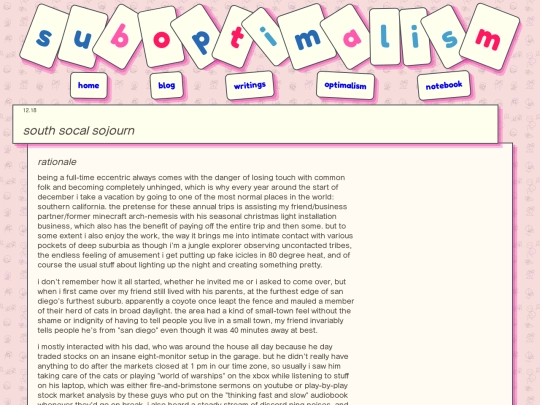



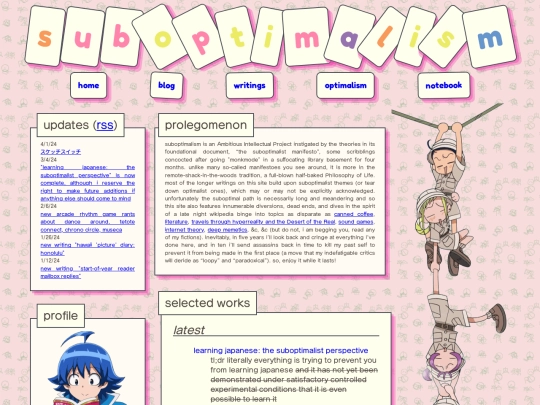

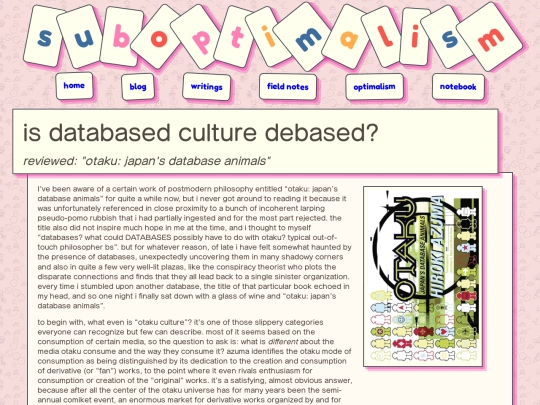
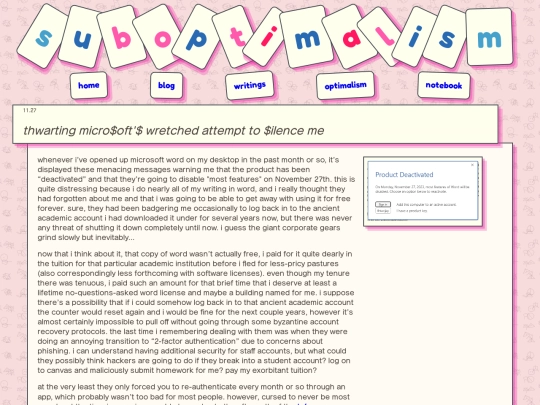
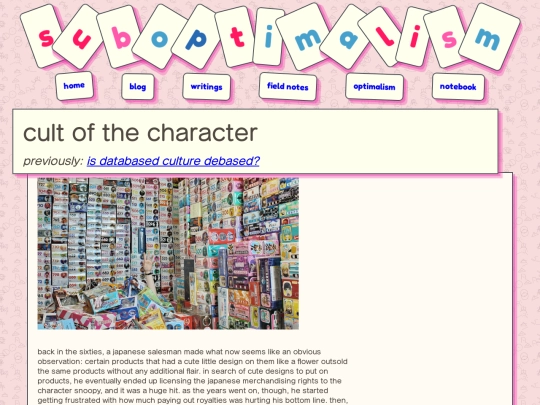















































































































running sucks and i love it